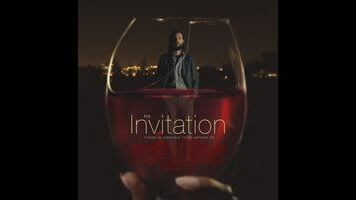Skillful craft and creepy atmosphere make The Invitation worth accepting

A skillfully executed slow-burn thriller for a cynical age, The Invitation begins on an ominous note as bearded L.A. hipster Will (Logan Marshall-Green), in the midst of a petty argument with his girlfriend Kira (Emayatzy Corinealdi), hits a coyote with his car. Unwilling to let the poor injured creature suffer, Will fetches a tire iron from his trunk and quickly dispatches it just off camera. Shaken, he gets back into the car, and the couple continues on their way to a dinner party being thrown by Will’s ex-wife Eden (Tammy Blanchard) and her new beau David (Michiel Huisman) at the stylish midcentury modern home Eden and Will used to share. Will hasn’t seen his ex for two years, and is understandably anxious about their reunion. But everything, Kira assures him, will be fine.
With this simple setup, director Karyn Kusama establishes the near-apocalyptic sense of dread that will dominate the rest of the film. Kusama expertly manipulates the tone throughout, ratcheting up tension and releasing it in quick bursts of nervous laughter, only to build it up again. Much of the first half plays out as a pitch-black comedy of manners, as David and Eden awkwardly introduce two new friends, freewheeling hippie chick Sadie (Lindsay Burdge) and the intimidating Pruitt (John Carroll Lynch), to the assembled party. The foursome met through The Invitation, a New Age group (or, as Will calls it, a cult) that recruits people who have experienced profound grief. The Invitation has transformed the formerly suicidal Eden into a beatific picture of earth-mother bliss, so everyone figures it must be okay. So what if their recruitment video is a little creepy?
Still, little inconsistencies—a locked door, a jar of pills, an inappropriately personal comment—keep piling up. Kusama enhances the unease by shooting conversations in claustrophobic closeup, withholding crucial pieces of visual information behind doors and just around corners. The dinner itself is a delirious fever dream, and the characters’ tragic backstory is revealed in spurts as common household objects prompt flashbacks in an increasingly agitated and paranoid Will. With the help of Phillip Blackford’s atmospheric sound design and Theodore Shapiro’s unsettling score, Kusama plays with the audience’s sense of reality, first establishing Will as the voice of reason, then questioning the reliability of his perspective. It’s a cruel trick, and a clever one.
The Invitation does take a little too long getting where it’s going, and it doesn’t take a genius to see how all this will end. But the strong craftsmanship in front of and behind the camera keep the journey engrossing, and when everything comes together, it does so with such jarring intensity that by the time the audience finally regains its footing, we’ve reached the final scene of the film. And it’s a knockout. It’s been nearly 50 years since the hippie movement’s utopian dreams bled out in the summer of 1969, and our culture has only grown more cynical in the decades since. But there are still broken people out there searching for answers, and there are still self-appointed gurus waiting for them with open arms and big fake smiles. And sometimes it’s hard to tell what those smiling faces are hiding behind their backs.